Found a total of 10000 related content
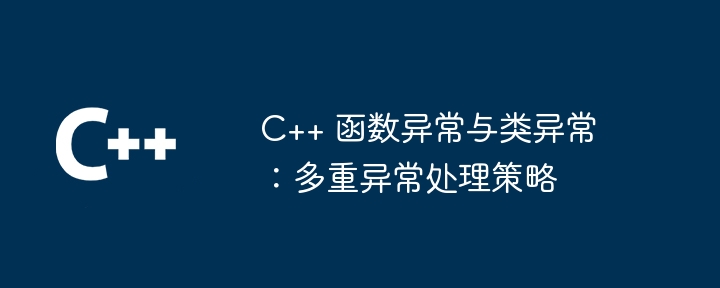
C++ function exceptions and class exceptions: multiple exception handling strategies
Article Introduction:C++ exception handling is divided into two types: function exceptions and class exceptions. Multiple exception handling strategies include handling one by one and capturing base classes. In actual combat, exception handling strategies can be used to handle exceptions from different sources and print different error messages according to the exception type.
2024-05-03
comment 0
313

How to solve Java exception chain exception (ChainedException)
Article Introduction:How to solve Java exception chain exception (ChainedException) Introduction: When developing Java applications, we often encounter exception handling situations. Sometimes a method may throw multiple exceptions, and there may be relationships between these exceptions. In order to preserve the correlation between exceptions, Java provides the exception chain (ChainedException) mechanism. This article will introduce how to solve the problem of Java exception chain exception and provide code examples. What is an exception chain?
2023-08-19
comment 0
1601
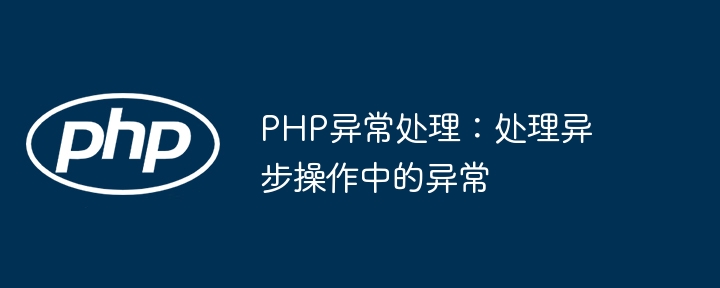
PHP exception handling: handling exceptions in asynchronous operations
Article Introduction:Handling PHP exceptions in asynchronous operations requires: In coroutines, use try-catch-finally syntax to catch exceptions. In Promise, use the then() and catch() methods to handle exceptions. Practical case: Use coroutines to handle exceptions in HTTP requests, and capture and handle exceptions.
2024-06-02
comment 0
831

Exceptions and exception handling mechanisms in JavaScript
Article Introduction:JavaScript is a language commonly used for web page markup and script programming. Like other programming languages, JavaScript also contains exceptions and exception handling mechanisms. This article will introduce exceptions and exception handling mechanisms in JavaScript to help readers better understand and respond to exceptions in JavaScript programs. 1. Exceptions in JavaScript In JavaScript, exceptions refer to errors or abnormal situations encountered by the program during execution. These anomalies may originate from browser
2023-06-15
comment 0
1892
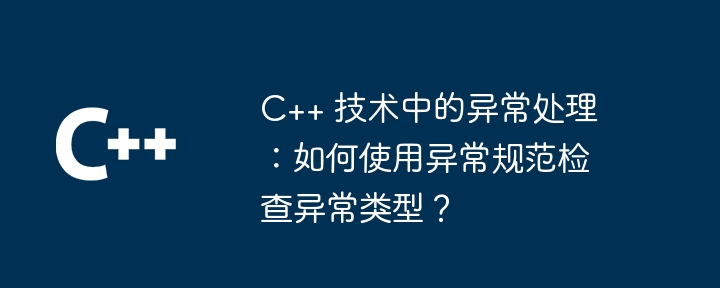
Exception handling in C++ technology: How to check exception types using exception specifications?
Article Introduction:Exception specifications in C++ can specify the types of exceptions that may be thrown by a function to ensure correct handling of exceptions. To use exception specifications, use the noexcept keyword in a function declaration, followed by a list of exception types. For example, in the divide function, use noexcept(std::invalid_argument) to specify that only invalid_argument exceptions may be thrown, ensuring that other exception types will cause compiler errors.
2024-05-09
comment 0
658
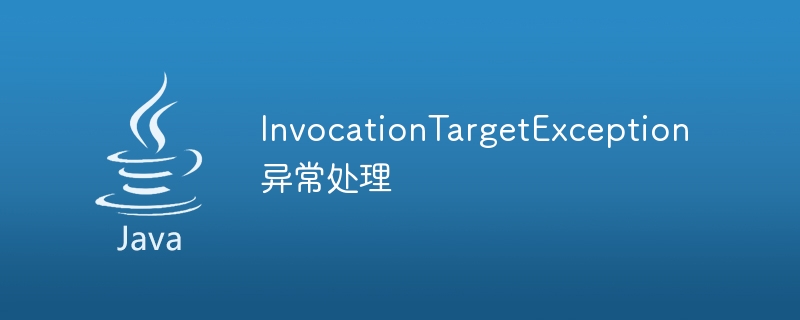
InvocationTargetException exception handling
Article Introduction:InvocationTargetException exception handling steps: 1. Get the root cause of the exception through the "getCause()" method of InvocationTargetException; 2. Use the "printStackTrace()" method of InvocationTargetException to print the exception information; 3. You can use the try-catch statement to capture the root cause of the exception. The cause of the exception; 4. Distinguish between business exceptions and system exceptions.
2023-08-04
comment 0
5864
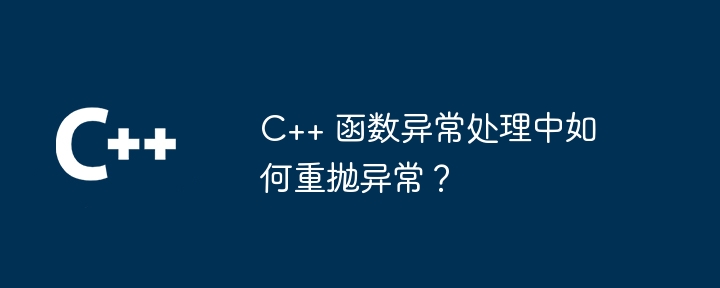
How to rethrow exceptions in C++ function exception handling?
Article Introduction:Exception rethrowing in C++ is used to rethrow an exception after catching it so that other parts of the program can handle it. The syntax is: try{...}catch(conststd::exception&e){//Exception handling//...//Rethrow exception throw;}. Caught exceptions can be rethrown in the catch block by using the throw keyword. This exception will terminate the function and let the superior function handle the exception.
2024-04-15
comment 0
969
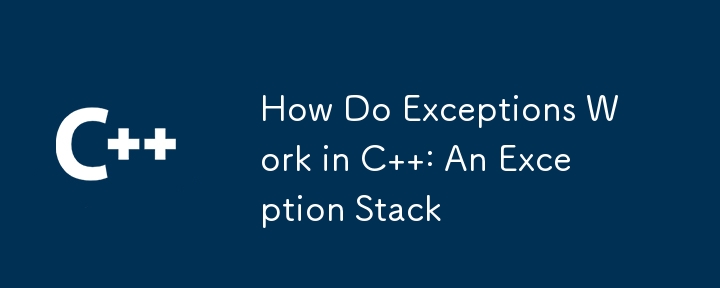
How Do Exceptions Work in C : An Exception Stack
Article Introduction:This article discusses how exceptions are handled in C through the use of an exception stack. The exception stack stores information about the exception thrown, enabling the program to jump to the nearest matching catch block. The catch block then
2024-10-24
comment 0
210

Exception handling and exception specifiers for C++ functions
Article Introduction:Exception handling handles runtime errors, including throwing, catching, and handling exceptions. Exception specifiers are used to specify the types of exceptions that a function can throw, including noexcept(expr) (specifies not to throw an exception) and throw() (specifies that any type of exception can be thrown). In the actual case, the print_file function uses the throw() specifier and uses the try-catch block to capture the std::runtime_error exception in the main function and handle the file opening error.
2024-04-12
comment 0
670

How to use exception filters and exception handling in C#
Article Introduction:How to use exception filters and exception handling in C# requires specific code examples. Exceptions are errors or unexpected situations that occur during program running. In C#, exceptions are handled by throwing and catching. Exception handling is a key part of ensuring the normal operation of the program. In C#, exception filters and exception handling are two common ways of handling exceptions. Exception filters allow us to filter and handle exceptions before catching them. It uses the when keyword to specify the conditions for the exception filter. Here is an example: try{
2023-10-08
comment 0
1160
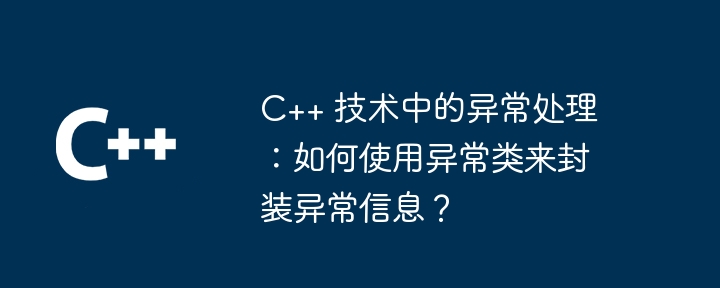
Exception handling in C++ technology: How to use exception classes to encapsulate exception information?
Article Introduction:The C++ exception handling mechanism allows encapsulation of exception information, deriving exceptions from std::exception through exception classes and using throw to throw exceptions. This class provides the what() method to obtain error messages, which can be used to handle specific exceptions in catch blocks to improve the clarity and efficiency of error handling.
2024-05-09
comment 0
712

How to use exception strategy to handle exceptions in C#
Article Introduction:How to use exception strategy to handle exceptions in C# requires specific code examples. In C# development, exception handling is a very important task. Reasonable exception handling can improve the robustness and maintainability of the program, and can also help us better track and fix bugs. This article will introduce how to use exception strategy to handle exceptions in C#, and give specific code examples. Catching exceptions using try-catch statements In C#, we can use try-catch statements to catch exceptions and handle them. The following is a simple
2023-10-09
comment 0
1063
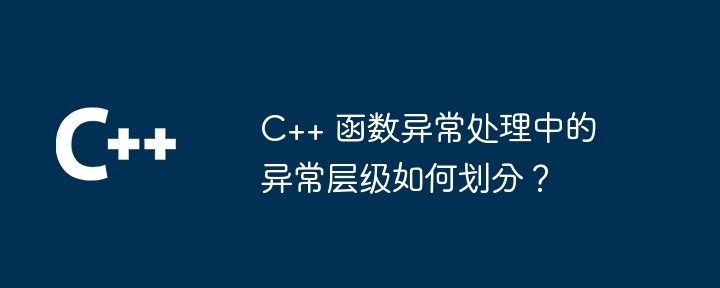
How to divide the exception hierarchy in C++ function exception handling?
Article Introduction:The exception hierarchy in C++ provides different exception class inheritance hierarchies for classifying exception situations. This level is rooted at the std::exception class and includes basic exceptions, runtime exceptions and logical exceptions. More specific exception classes are derived from these base classes. Through the exception handling mechanism, exceptions at different levels can be caught and corresponding measures taken as needed.
2024-04-15
comment 0
1094

PHP exception handling: a brief discussion of exception handling design patterns
Article Introduction:There are two design patterns for PHP exception handling: Object-oriented exception handling: Use try-catch blocks to catch specific types of exceptions. Procedural exception handling: Use the set_exception_handler function to set a global exception handling function to handle all uncaught exceptions. The choice of design pattern depends on the needs of the application: object-oriented exception handling provides a more structured approach, and procedural exception handling provides a more general approach.
2024-06-02
comment 0
719
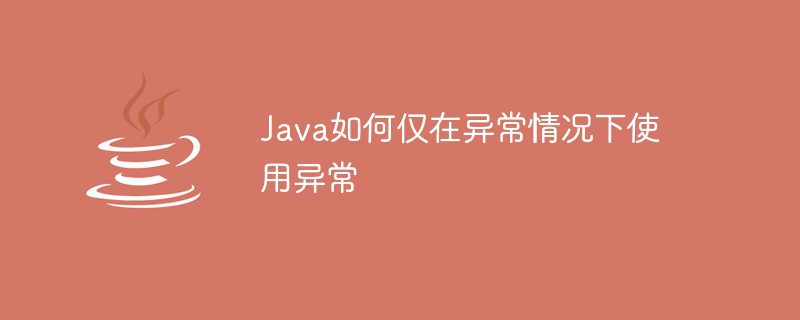
Java how to use exceptions only in exceptional cases
Article Introduction:Use Exceptions Only in Exception Cases The main purpose of this option is to avoid using exceptions for normal control flow. For example, instead of using an exception to terminate the loop control flow: try{Iteratoriter=...;while(true){Foofoo=i.next();...}}catch(NoSuchElementExceptione){} regular iteration over the collection should be used :for(Iteratoriter=...;i.hasNext();){Foofoo=i.next();...} I didn't find any examples using regular control flow exceptions.
2023-04-19
comment 0
893

Exceptions in C#
Article Introduction:Exceptions are problems that occur during program execution. C# exceptions are responses to unusual conditions that occur while a program is running, such as an attempt to divide by zero. Exceptions provide a way to transfer control from one part of a program to another. C# exception handling is based on four keywords - try-try block identifies the block of code that activates a specific exception. It is followed by one or more catch blocks. catch - A program uses an exception handler to catch exceptions in a program. Want to deal with this issue. The catch keyword means catching exceptions. The finally-finally block is used to execute a given set of statements regardless of whether an exception is thrown or not thrown. For example, if you open a file, you must close it regardless of whether an exception is thrown or not.
2023-08-31
comment 0
614

PHP exception handling: understand system behavior through exception tracking
Article Introduction:PHP exception handling: Understanding system behavior through exception tracking Exceptions are the mechanism used by PHP to handle errors, and exceptions are handled by exception handlers. The exception class Exception represents general exceptions, while the Throwable class represents all exceptions. Use the throw keyword to throw exceptions and use try...catch statements to define exception handlers. In practical cases, exception handling is used to capture and handle DivisionByZeroError that may be thrown by the calculate() function to ensure that the application can fail gracefully when an error occurs.
2024-06-05
comment 0
1080

How to fix: Java exception handling error: Uncaught exception
Article Introduction:How to solve: Java exception handling error: Uncaught exception Introduction: In Java programming, exception handling is a very important part. Proper handling of exceptions can improve the stability and reliability of the program and prevent uncaught exceptions from occurring during program operation, causing the program to crash or exit abnormally. This article will introduce a common Java exception handling error: "uncaught exception" and provide solutions and sample code. 1. What is an uncaught exception? An uncaught exception refers to an exception that is thrown in the code but is not handled.
2023-08-19
comment 0
2420

Exploration on the principle of C++ function exceptions: Understand the bottom layer of exception handling
Article Introduction:C++ exception handling principle: Throwing an exception: Use the throw keyword to throw an exception object. Catching exceptions: Use the catch keyword to catch specific types of exceptions. try-catch block: Place the code segment in a try-catch block to handle exceptions. Practical case: The throwError() function throws an exception, and the main() function uses the try-catch block to print the error message. Custom Exceptions: Custom exception classes derived from std::exception can be created to represent application-specific errors.
2024-05-01
comment 0
1035

Java JSP Exception Handling: Handling Errors and Exceptions
Article Introduction:Exception handling is crucial in Java and jsP programming as it allows applications to handle errors and exception situations gracefully, thereby improving robustness and user experience. Exception Handling in JSP JSP provides three main mechanisms to handle exceptions: page directive: This directive specifies an error handling page that handles all unhandled exceptions on a certain page. try-catch block: This block allows developers to define specific handlers for handling specific types of exceptions. JavaBean: Exception handling logic can be encapsulated in JavaBean and then used in JSP pages. page directive The syntax of the page directive is as follows:
2024-03-18
comment 0
1175



















